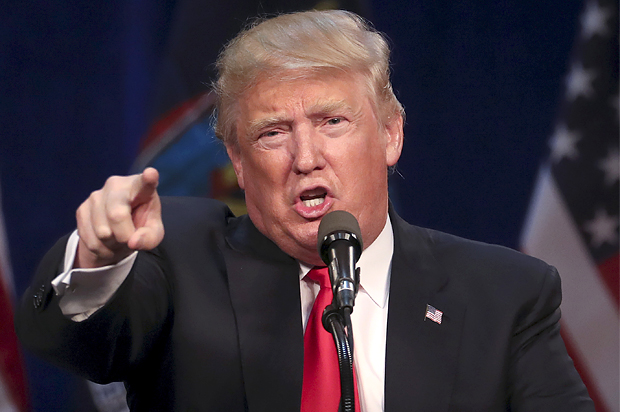CHAOS: The news media scrambles to get a word from Trump, but he continues to insult and ignore their pleas.
By Jacob Ferrall, Staff Writer
It has been about three months since the 2016 presidential election took place, and President Donald Trump and the news media have not ceased their accusations at each other. Trump has maintained an ever-prevalent presence on social media, making bold claims, while news reporters are searching for any evidence to slander him─more than he already does to himself on Twitter. In late November, Trump stated, “In addition to winning the Electoral College in a landslide, I won the popular vote if you deduct the millions of people who voted illegally.” After various news researchers found no evidence of mass voter fraud, Trump proceeded to insult a Cable News Network (CNN) reporter, declaring his network “fake news.” Unfortunately, this is just one of many baseless claims that the President asserts on the internet.
Trump may make very arrogant and, at times, incorrect statements, but that does not exclude the media from being routinely at fault. Recently, Meryl Streep’s speech at the Golden Globes garnered attention after she accused Trump of mocking a disabled New York Times reporter. The reporter has a condition which restricts control over his arm movements, and Trump supposedly mimicked his condition during a conference. However, this accusation was originally made over a year ago, and Meryl Streep was unnecessarily resurfacing it. It was dismissed because Trump uses expressive arm gestures almost every time he mocks someone, and Trump was insulting the reporter’s claims from his article; it is highly unlikely that he would know the author’s physical appearance. In fact, Trump cited an article by the reporter dating back to 2001 claiming that there were thousands of people celebrating the World Trade Center attack, and later the reporter claimed that he never said there were that many people celebrating the incident. “Uh I don’t remember what I said, I don’t remember,” Trump said, while ridiculing the reporter. Trump was in fact mocking someone, but it was not an attack against his or her physical disability.
Perhaps the most relevant accusation against Trump at the moment is the claim that he has had ties with Russia. On January 10, BuzzFeed released a dossier from an alleged former British intelligence official who wrote that Trump was receiving information about his opponent Hillary Clinton and gaining support in the election from Russia. The dossier also mentioned Trump participating in sexually perverted acts as well as other lascivious actions. These unverified documents were not backed by evidence, yet CNN and Buzzfeed irresponsibly publicized these accusations. Only a few days later, the whole dossier was confirmed to be a hoax by U.S. and Russian officials and was criticized by other news outlets. When the outlet faced significant backlash, Buzzfeed Editor-in-Chief Ben Smith justified the decision by saying it “reflects how [Buzzfeed] sees the job of reporters in 2017″ in a Twitter post. But unsubstantiated reports are the exact opposite of what journalism stands for. When journalists doubt the veracity of report, their first instinct should be to withhold publication. In a sense, journalists are the gatekeepers of information to the general public, and have a responsibility to provide accurate information, not rumors presented as conspiracy. This debacle on lends credence to Trump’s claims that news outlets are “fake.” The entire fiasco was a demonstration of unprofessional journalism with the promotion of fake news.
Recently, a press conference was held at Trump Tower where news stations demonstrated this unprofessionalism by flinging insults at each other and fighting to ask Trump a question. Trump knows the state of the media, and he pitted them against each other. During the press conference, Trump blatantly refused to answer many of the posed questions and heavily insulted news reporters. “Your organization is terrible, [and] you are fake news,” Trump remarked after being questioned by a CNN reporter. Trump brutally controls the news media, while it tries to gain its popularity by reporting stories against him. Both are handling their disagreements in an immature way, devoid of calm and rational argument.
This pattern of the media accusing Trump and Trump responding with disrespectful comments will continue until the President starts to answer questions seriously. With the controversy surrounding his presidency and an extremely low approval rating of about 45 percent, there is no guarantee that the media will stop attacking him. However, he could potentially win the arguments with an intelligent response. If Trump succeeds at this, he will garner better approval ratings and gain more public support. Various news outlets are also diminishing their credibility from the exposure of fake news, and would benefit from indulging in honest journalism. With less volatile articles, the news media would most likely receive more beneficial answers from Trump. The situation has become a spectacle for the public in dire need of more professional behavior.

